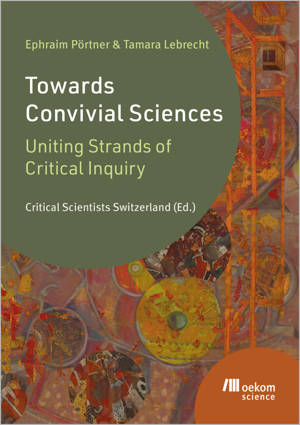
Bedankt voor het vertrouwen het afgelopen jaar! Om jou te bedanken bieden we GRATIS verzending (in België) aan op alles gedurende de hele maand januari.
- Afhalen na 1 uur in een winkel met voorraad
- In januari gratis thuislevering in België
- Ruim aanbod met 7 miljoen producten
Bedankt voor het vertrouwen het afgelopen jaar! Om jou te bedanken bieden we GRATIS verzending (in België) aan op alles gedurende de hele maand januari.
- Afhalen na 1 uur in een winkel met voorraad
- In januari gratis thuislevering in België
- Ruim aanbod met 7 miljoen producten
Zoeken
Towards Convivial Sciences
Uniting Strands of Critical Inquiry
Ephraim Pörtner, Tamara Lebrecht
Paperback | Engels
€ 28,95
+ 57 punten
Omschrijving
Science is under threat. Scientists are marching to defend it against populist attacks, antiscientific sentiment, and censorship. At the same time, science is expected to solve our biggest crises - climate change, biodiversity loss, or rising social inequality - while becoming increasingly entangled with big money, technological solutionism, and promises of progress. So, what kind of science are we defending? This book takes a critical look at the dominant model of science: shaped by colonialism, imperialism, a belief in human control over nature, and economic pressures. It reveals how this model - purportedly neutral and universal - is in fact deeply political and reductionist. We ask what other forms of science we might aspire to. Bringing together decolonial, feminist, and ecological perspectives, we propose more democratic, humble, and pluralistic ways of knowing and researching the world: convivial sciences.
Specificaties
Betrokkenen
- Auteur(s):
- Uitgeverij:
Inhoud
- Aantal bladzijden:
- 242
- Taal:
- Engels
Eigenschappen
- Productcode (EAN):
- 9783987261664
- Verschijningsdatum:
- 4/07/2025
- Uitvoering:
- Paperback
- Afmetingen:
- 145 mm x 15 mm
- Gewicht:
- 365 g

Alleen bij Standaard Boekhandel
+ 57 punten op je klantenkaart van Standaard Boekhandel
Beoordelingen
We publiceren alleen reviews die voldoen aan de voorwaarden voor reviews. Bekijk onze voorwaarden voor reviews.









